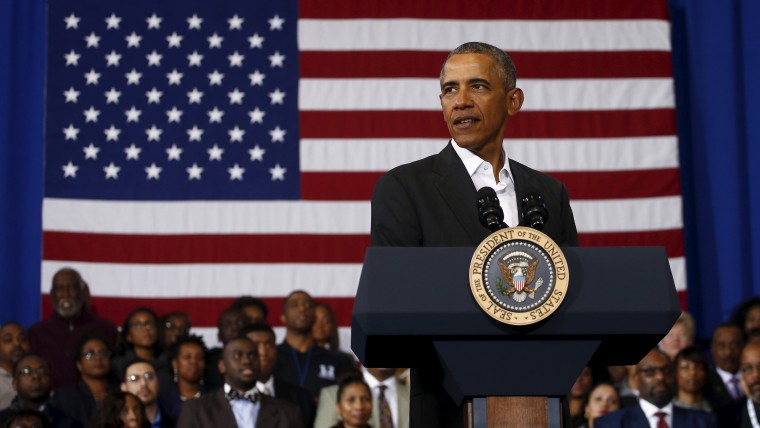It was probably the angriest President Obama had been during a press conference. The day after the historic international nuclear agreement with Iran was announced in July, the president fielded questions from reporters at the White House, and CBS News' Major Garrett noted the Americans who were still detained in Iran at the time.
"Can you tell the country, sir, why you are content, with all the fanfare around this deal, to leave the conscience of this nation and the strength of this nation unaccounted for in relation to these four Americans?" Garrett asked a visibly livid president.
After describing the reporter's question as "nonsense,"
Obama explained, "I've met with the families of some of those folks. Nobody is 'content.' And our diplomats and our teams are working diligently to try to get them out."
And as of yesterday, they are, in fact, out. The
Washington Post put it
this way:
Six months later, Obama made good on his pledge when Iran released five U.S. citizens Saturday, including Washington Post correspondent Jason Rezaian, who spent 544 days in captivity. It was an I-told-you-so moment for a president who has bet his foreign policy legacy on the high-stakes nuclear agreement with Tehran that has been denounced by his critics as a capitulation to an untrustworthy U.S. enemy.
That gamble has paid off in ways even optimists probably find surprising. As a result of the deal, and Iranian officials' willingness to honor their commitments, Iran has shipped 25,000 pounds of low-enriched uranium materials out of the country; it's accepted IAEA weapons inspectors; it's used concrete to fill its heavy-water reactor in Arak; and it's dismantled more than 12,000 centrifuges.
It's a vindication of the Obama administration's policy, which has turned out to be quite effective, and the kind of breakthrough that Americans can be proud of. Indeed, when it comes to U.S. policy in the Middle East, heartening developments have been far and few between, but welcoming home these Americans, held for too long in Iran, can be a unifying cause for celebration.
At least, that is, in theory.
In reality, many of the president's Republican critics spent the weekend complaining, doing their very best to turn the developments into yet another partisan dispute.
Under normal circumstances, when good things happen for the United States, there's nothing wrong with being happy -- especially if you intend to lead the United States. But in this case, most Republicans were so reflexively opposed to diplomacy with Iran, so repulsed by any of President Obama's successes, and so worried about the possible perception that the White House's foreign policy is actually working, several national GOP candidates
condemned the triumph -- the success was "
a sign of weakness," according to Republicans -- and conservatives went out of their way to
deny Obama credit for the positive developments.
Of particular interest, some presidential candidates and GOP leaders on Capitol Hill insist that the Americans detained in Iran were "hostages" and the White House had paid a "ransom" -- in effect, setting a "dangerous" precedent by negotiating with terrorists. A
Washington Post report explained that "precedent is actually on President Obama's side."
Even before the Iran hostage crisis, [Brian Michael Jenkins, a Rand Corp. expert who has written about how governments handled prisoner exchanges and hostage crises] noted, presidents exchanged prisoners with America's sworn enemies -- particularly with the Soviet Union, which in many cases held prisoners for charges just as trumped-up as those against the American prisoners released this past weekend. The first East-West Cold War prisoner exchange was dramatized in last year's Hollywood movie "Bridge of Spies," and similar prisoner exchanges continued into the '80s under Reagan -- including the 1986 exchange of Soviet dissident Natan Sharansky for the CIA mole Karl Koecher. A top congressional Democrat pushed back on the Republican efforts to cloud the prisoners' release Sunday. Rep. Adam Schiff (D-Calif.), the ranking member of the Permanent House Select Committee on Intelligence, said the release "ought to be cause for celebration, not political condemnation." "I think most Americans are thrilled that these fellow citizens are coming home," he said. "The few Americans who don't seem pleased all seem to be running for president."
It may seem counter-intuitive to see those running for president complaining about an American success story, but in 2016, Republicans are heavily invested in convincing their base that the United States is unraveling; President Obama is literally incapable of doing anything right; and all news, no matter how encouraging,
must be seen through a prism of dystopian despair.
For the rest of the country, however, the weekend's developments offer new hope. In brief remarks yesterday, Obama told the public, "
This is a good day." From a reality-based perspective, it's awfully hard to disagree.
* Correction: I'd originally said Major Garrett worked for National Journal, which was true, but he's now the White House correspondent for CBS News. I've corrected the above text.
